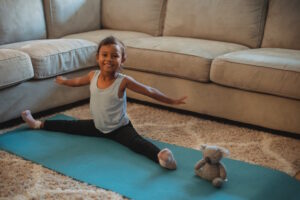
Instilling healthy habits in children from an early age is crucial for their overall well-being and long-term health. Physical activity plays a vital role in a child’s development, and Pilates, with its focus on mindful movement and body awareness, can be an excellent choice for children. Pilates not only promotes physical fitness but also cultivates mental and emotional well-being. In this article, we will explore how to instill healthy habits in children, the benefits of Pilates for children, the appropriate age to start Pilates, and the importance of practicing healthy habits from a young age.
How do you instill healthy habits in children?
Instilling healthy habits in children requires a holistic approach that encompasses various aspects of their lives. Here are some strategies to help instill healthy habits in children:
1. Be a role model: Children learn by example, so it’s essential to model healthy habits yourself, such as engaging in regular physical activity, making nutritious food choices, and prioritizing self-care.
2. Create a supportive environment: Surround children with a supportive environment that encourages healthy habits. Have healthy snacks readily available, limit screen time, and provide opportunities for physical activity.
3. Make it fun: Engage children in activities that they enjoy, such as sports, dance, or Pilates. Make physical activity a fun and enjoyable part of their routine.
4. Educate and involve them: Teach children about the benefits of healthy habits and involve them in decision-making processes, such as meal planning or choosing activities.
Why is Pilates good for children?
Pilates offers numerous benefits for children’s physical, mental, and emotional well-being. Here’s why Pilates is good for children:
1. Promotes body awareness: Pilates teaches children to connect with their bodies, enhancing body awareness and fostering a positive body image.
2. Enhances strength and flexibility: Pilates exercises help children develop strength, flexibility, and coordination, which are essential for overall physical fitness and sports performance.
3. Improves posture and alignment: Pilates focuses on core strength and postural alignment, helping children develop good posture and reduce the risk of musculoskeletal issues.
4. Cultivates mindfulness: Pilates emphasizes mindful movement and breath awareness, teaching children to be present in the moment and manage stress.
What is the best age to start Pilates?
The best age to start Pilates can vary depending on the child’s individual development and readiness. Generally, children as young as 6 or 7 years old can start participating in Pilates classes or activities specifically designed for their age group. At this stage, children have sufficient body awareness and motor skills to engage in Pilates exercises with guidance and supervision. It’s important to choose age-appropriate Pilates programs that consider the child’s physical abilities and limitations. Pilates sessions for children should be enjoyable, engaging, and tailored to their developmental stage to ensure a positive experience.
Why is it important for children to practice healthy habits?
Practicing healthy habits from a young age is crucial for children’s overall well-being and sets the foundation for a lifetime of good health. Here’s why it is important for children to practice healthy habits:
1. Physical health: Healthy habits such as regular physical activity and balanced nutrition support healthy growth and development, improve cardiovascular fitness, and reduce the risk of chronic diseases.
2. Mental and emotional well-being: Healthy habits promote positive mental health, reduce stress, enhance self-esteem, and improve concentration and academic performance.
3. Long-term behavior patterns: Establishing healthy habits early in life helps children develop a positive relationship with their bodies and establish long-term behavior patterns that contribute to a healthier lifestyle in adulthood.
4. Prevention of health issues: Healthy habits, including exercise and nutritious eating, can prevent obesity, promote healthy weight management, and reduce the risk of lifestyle-related diseases.
Instilling healthy habits in children involves being a role model, creating a supportive environment, making it fun, and educating and involving children in decision-making processes. Pilates is good for children as it promotes body awareness, enhances strength and flexibility, improves posture and alignment, and cultivates mindfulness. The best age to start Pilates is generally around 6 or 7 years old, considering the child’s developmental readiness. Practicing healthy habits from a young age is important for children’s physical health, mental and emotional well-being, long-term behavior patterns, and prevention of health issues. By introducing Pilates and healthy habits early on, we can empower children to lead healthier and happier lives.